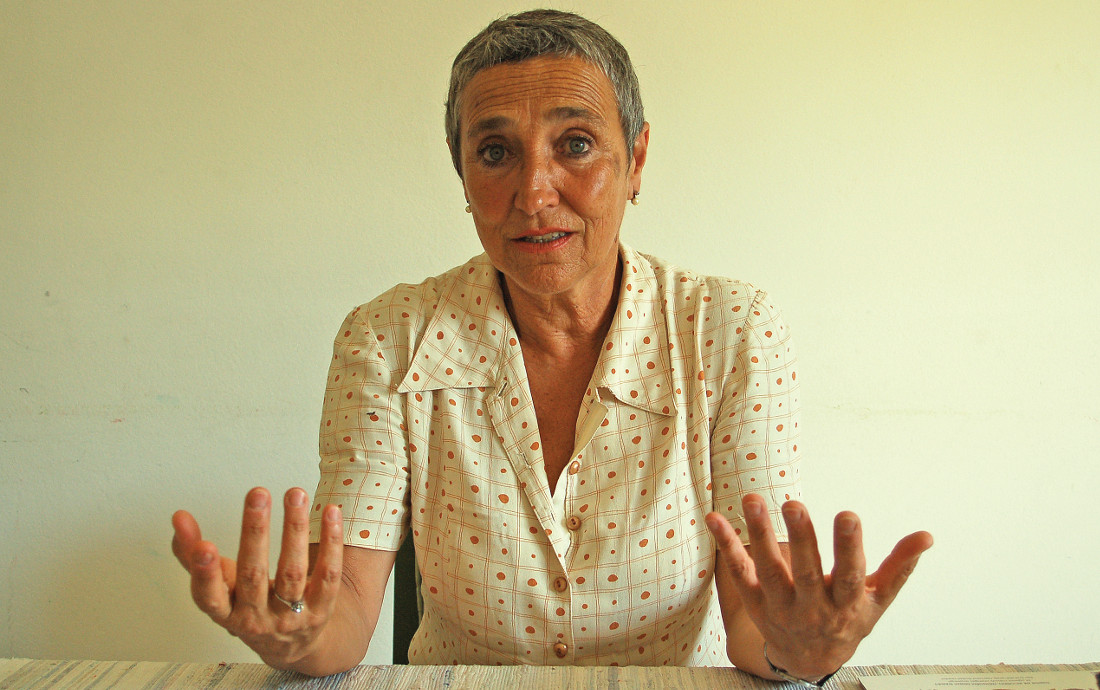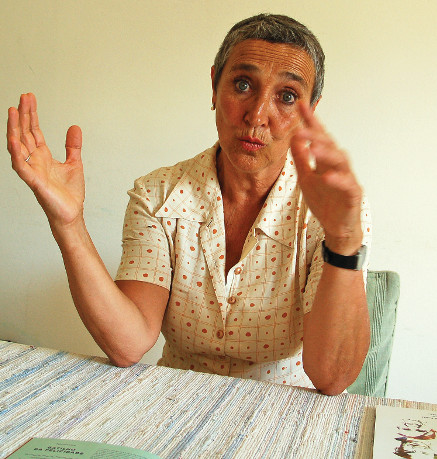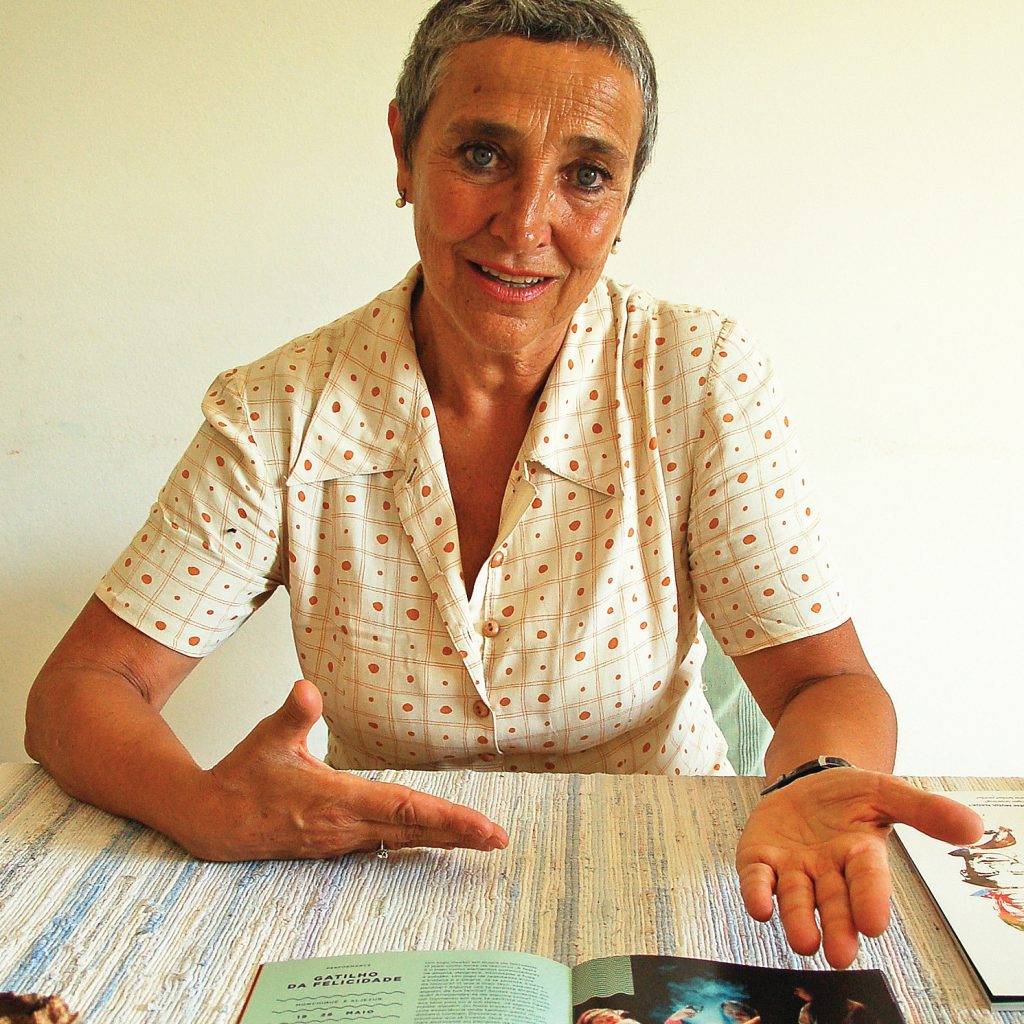Can culture change our habits?
I believe in the transformative power of art.
Why?
Because the arts have the capacity to divert people from the norm, from normality, and, by going through a different experience they might want to repeat it. An artistic project also provides intuition, sensibility, the capacity to escape from this more materialistic way of seeing things.
My intention is to offer artistic objects of great quality to people who have other cultures and who approach this artistic culture in order to draw incredible dividends from it for their everyday lives and for their inner selves. That is the circular design of this project, which is to give an object back to people. We follow a path which is a path of encounter, so that people can change direction and come to us. And that is one way of reusing, recycling and returning to one’s origins.
If art has the function of stimulating and cultivating, do you have the hope that culture can influence the economy?
Absolutely. Art helps us, on the one hand, to gain a better understanding of the palette that spins around us on a particular subject. There is an unequivocal way of looking at things, and artistic experience stirs up this rather closed way of looking. And this stirring gives people the possibility of understanding certain things with a smile on their face.
When people go to a theatre they close the door on reality and enter a different world. And this world that they come and visit speaks to them in a different way about a series of aspects that are out there. I remember that at the CCB (Belém Cultural Centre) children grew in the space of an hour. They left taller, they left talking and smiling because they had seen things that had clicked in them in some way; they suddenly stopped being afraid of things they had been afraid of; things they did not understand or were part of their solitude, ceased to be that, they belonged to the collective.
Often, the artistic experience will give those who come to see it not just the chance to appreciate it in aesthetic terms, but also in terms of the content that is inherent in that work. In this way, being able to appreciate art means being able to understand both its essence and its content, and it is this that gives people strength. And strong people have the capacity to act. That is why the arts play this key role.

But when someone opens the door, leaves the performance and returns to normality, day-to-day life dominates again. We have to ask ourselves how we want to live. How do you want to live?
I want to live as exactly as I do. In that sense, I was lucky. I found what I wanted to be able to do quite early on. And I took a long time to manage to do so. It took about 20 years to be able to achieve a way of working which gave me freedom of action.
I worked in many large organisations and I was always dismissed. There was always a moment when I became uncomfortable. I am very ambitious, not for myself, but for the objectives that I am aiming for, so sometimes these objectives are so radically human and are so close to the least protected classes and to what is essential for life that certain forces cannot put up with them. My priority is sometimes not the priority of the powers that be, for example.
That is what happened at the Higher School of Dance/Conservatory. I had the opportunity to open the first higher school of dance, with a number of colleagues, the first degree in that field. I was very young: there were teachers who were much more experienced than I was, who invited me, and I made my contribution from the experience I had from the University of London, and I started working with the younger teachers. This licenciatura degree became so powerful that the students quickly started to create and to be able to teach, to create short plays in social venues where they could see their work having an impact on audiences, even on a small scale. And all this appeared to be a threat for a more traditional and more orthodox vision of academic education. So I ended up being dismissed with one of my colleagues.
The same thing happened at the CCB. The project had such power that a particular moment arrived when that power wasn’t wanted. I stay at places as long as I am useful. In fact, at the CCB it was I who resigned because I could sense that my work was no longer useful.
You were born in 1956…?
Yes, on 30th November. I’m a Sagittarian.
You spent your first 18 years living under a dictatorship. What remains with you from that time?
My brothers and I ran from our house to watch the Revolution happening in the streets. And what disgusts me most is to understand that Education, in the most fundamental sense of the term, was not given to people who lived in my country during 50 years of fascism. And this still has extremely serious consequences in the schools we have today. Schools that, after 40 years, have been transformed of course, but there are failings, major failings.
What affects me most about the impact that fascism had on my country is the ignorance. The lack of education given to the Portuguese people. These people lived in poverty throughout the period of fascism – and I am talking about the real Portuguese people, I’m not talking about the small elite that made up the Portuguese population that lived mainly in the two major cities (Lisbon and Porto), and in some cities in the provinces. They had no opportunity to study. The State didn’t allow this to happen, so that it could control the destiny of the country as it saw fit.
I go through the countryside, through the uplands of the serra, and I still come across people who can neither read nor write, and others who have very precarious levels of schooling. And this is still happening, even today, 40 years after that extraordinary moment that was the 25 April revolution, which I experienced when I was between 17 and 18 in Lisbon while at the German School.
I am a person from the arts who is very interested in the relationship that dance can have with education – it was one of the subjects that I studied most, during my licenciatura degree and later during my Master’s, which I did in England. I then came to Portugal and wanted to put forward a programme, in these 39 years… I started working at the age of 24, now I’m 63…
…of which you spent 13 at the CCB…
Yes, working on the relationship that the arts can have with the whole country. It was an extremely interesting period, especially the first five years of the experience at the CCB, with a management that was very focused on the role that the arts can play in the development of a society. It was possible to have projects for enlargement, expansion and communication with other cultural organisations in the country which started to have what were known as educational services or the artistic and cultural activities for the people on the margins, who are not the audience from that elite (children, the older members of the public, the most illiterate and those who would never go to the theatre off their own bat). That time at the CCB was very important because it was to some extent responsible for the birth of a series of other projects in education or public culture.
What memories do you have of your childhood, your mother, your home and cooking?

My mother was, and still is, an excellent housewife and she made a point of teaching her children everything: ironing, putting the rubbish bin out in the street so that the kitchen would always smell nice – and we lived on the fourth floor, with lots of stairs – the discipline to do what was needed; going to buy milk in glass bottles very early in the morning; learning to cook. And as my mother worked, she was a teacher, and my father was a civil and mining engineer – he worked on the railways – my father was also a traveller – there were days when we adolescents were responsible for the meal. On Thursdays, it was my turn to cook the meal for everyone. My father also cooked and it was healthy food, full of vegetables, and good fish, boiled, everything was stewed, boiled or baked, in the oven, and I am still part of that culture, of making something marvellous with the things in the fridge. My parents weren’t rich, we had to economise a lot at home. I wore my elder sister’s dresses.
And then there was the discipline of the German school, where my mother was a teacher, a school that came into being when the German Jews came to Portugal. My grandfather, who had just one daughter, wanted to give her a special education, which would be a weapon for life. And that’s what I feel my country didn’t have, that weapon for life that is called education. And I’m still working on this, helping people to know more through what I know, which is art.
That discipline in my parents’ house was sometimes very difficult because they were very hard-working and very strict. There was little room for laziness or for leisure. We used to go digging with my father, who had a small plot, gathering potatoes and helping. I learned to do everything with my hands and I must also say that I passed this on to my son. I think people regard me as a workaholic, I love doing what I do. When I was young, I fought against all that, but then it became part of me. I am very disciplined and very focused on work, but it’s not an obligation, it is a way of being. I want to spend my life working because I dream about my work and I wake up doing projects. And my dinners with friends are always with artists talking about things they want to do. I am always immersed, I don’t know how to be anything else.
How do I want to live? I want to be healthy – that’s something I would like a lot – and have been so far. When I was ill, I also liked that, because I came close to a state that is not natural for me. I learnt a lot alongside people who were in the queue for operations, in the Santa Maria Hospital. Those were very powerful experiences. I was married to an excellent doctor – a scientist and a clinician – who taught me a lot about immunology. We spent a long time living in London and in Portugal. I had the opportunity to experience that side of humanity, which is so tragic, so difficult, the treatment of diseases like AIDS. Sick bodies are also bodies that interest me, for dance. There are many choreographers working on this. I want to be healthy to work, but if I fall ill I will do something with the illness.
Does reducing our consumption mean reducing our travel, our movement, our energy? We throw a lot of things away, every day. What does your own balance sheet look like in this regard?
All the things you can see around you are used and old things that I recycle and re-use permanently. Recycling, reducing the price that things cost and reusing the raw materials is my philosophy. I agree with reducing the cost of the energy we waste, but I believe in mobilising the energy of men, women and children and older people more and more intensely. If they keep moving, movement is the energy that places us at one point with the desire to reach another – and that is the desire to do something, to achieve an objective, to carry out a particular task or simply to want to be alive in muscular terms – the muscles of the mind and the body, give us what we call sensibility – and if that separates people, it’s very sad.
I was referring to human activity. My speciality is not oil! I know that it is a source of energy, that it is an object of desire for capital, I know that the whole world depends on it, precisely because of the capital and global political power it generates.. I work in a field devoted to the study and appreciation of people as creators of an interior strength, of a self-concept or belief in themselves. People at present – and it was always like this – when they are children, they know how to use their energy in a magical way and then they start to forget this, concern about mental activity grows, activity relating to work, to social status; in terms of class, of acceptance, and recognition of what could be starting a family, for example.
Do you work against forgetfulness?

Yes. Children have bodies that are very alive. Adults forget the bodies they have. They only use them for sex, as a tool for work, as a place for an identity they seek, in some way to know who they are, and they don’t look for their vital energy in their bodies in order to be happy. When the body is alive, it vibrates, and when it vibrates it is warm, and when it is warm it makes it easier to feel a great sensation of freedom and power, at whatever age. Clearly, people lose physical qualities as they grow older, but they gain others. They gain, in the way they look at things, in understanding, in perceiving, and above all in the way they can use their own bodies. And all this knowledge is something I am very interested in passing on to people.
I am more interested in the enhancement and recognition of each person’s individual and unique energy, which, once activated, can have very interesting and very positive consequences for the individual, and for the whole environment around them. I am a woman of dance, and I am talking about dance when it overflows into one’s life, when it emerges from the black box, from the stage, from the studio, and starts to inundate one’s actual life. My work is about that. There is political work that is done through these performances.
Culture in the Algarve was always for the tourists. Now it is for everyone and, for the first time, we have the opportunity to grow with culture.
Our whole existence as human beings is extremely short, so we need to work on the quality of this life, the quality of the time we are given to live, and I believe that the arts, artistic discourse and practice play a very important part. The arts help us to broaden our horizons, to see things through a much more tolerant prism. They offer alternative visions of the world to the ones we are used to in a day-to-day reality that is more or less closed, more or less cultured, informed. The arts really are a weapon for development and for changing mentalities, and it is in this sense that you can speak of a revolution. And these are all revolutions created on the inside.
I said that my work is done from the bottom to top, my work is also done from the inside out. Everyone has dance inside them; they just don’t know it because they don’t understand or know what the essential elements are of the language of dance.
Algarve 365?
I have worked extensively with people of all types, in prisons, hospitals, people who live in the street, who are on the margins of society, children, adolescents… This “Trigger of Happiness” which is in our programme – is a project I identify with completely. There are young people from Aljezur and from Monchique, it was created by the artists João Galante and Ana Borralho and the young people talk freely about themselves, something they never do with adults. And it is a show with a strength and a power that contains things that their parents would be shocked and ashamed about, and this is one of the roles of art. When I talk about quality of life, I am talking about this awareness. I regard science and art like the Greeks, in parallel, with the same kind of power, and not just as a form of diversion or entertainment.
And I am passing through and I will go where I am called and where it is important to be. Sometimes they invite me, and other times I go there and ask. That’s what I am doing with Giacomo. We have been asking to do this project here in Monchique and Aljezur for six years. We have finally succeeded. And we want to continue, but not so that we can stay here comfortably and spend our old age here. Perhaps we will stay here, but if we opt – and now I’m speaking for myself – if we opt for a different place, I will go. For as long as I can do what I believe in, I will do it, and if they don’t let me do it here, then I will do it somewhere else.
And how do you want to live?
I want to live on a journey, I think, because I can see a wonderful journey, going through the hills of the serra every day between Monchique and Aljezur, going up and down. It’s so beautiful!
The journey continues…
Of course, until the last day I possibly can.
Thank you.
 Eco123 Revista da Economia e Ecologia
Eco123 Revista da Economia e Ecologia


